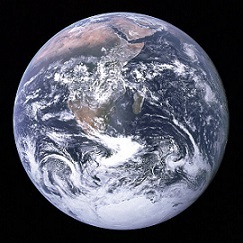
Shuttle gets hit by flying space junk; astronauts get thrown into space; astronauts must get back to earth somehow.
That's it. But it doesn't matter – no one in the audience
wants screenplay debris cluttering up this literally breathtaking spectacle anyway. Along
with plot and dialogue, deeper meanings about the human condition aren’t the
standout feature of Gravity.
But they occurred to me nonetheless, maybe
because my own human condition was much on my mind while watching the movie.
It seems I belong to that feeble minority of people genetically unable to endure the magic of 3D cinema. As Bullock and Clooney twirled vertiginously beyond my haze of nausea and a headache that felt like the top of my cranium was about to detach and go spinning off in sympathy, I found myself thinking: THIS is what space tourism will be like – mundane misery and lots of throwing up.
The irony that the multi-million-dollar state-of-the-art hi-tech Gravity touches on is that the multi-billion-dollar state-of-the-art hi-tech human endeavour that is space travel is frequently not glamorous at all, and always severely constrained by the limitations of the frail, fallible human body.
Like the space programme in reality, Gravity never
gets very far from Earth. Despite initial appearances, this isn't one of the current glut of science fiction movies bristling with aliens and
impossible gadgetry, set in a trendily distressed dystopia or a galaxy far away.
It arguably isn't sci-fi at all: the time is the present and the location is a mere 300-400km above the earth's surface. It's not particularly escapist. Earth, our beautiful, battered old ball-and-chain of a world, looms large; there's no getting away from it.
Space travel, extraordinary though it is, has only got a handful
of us as far as the Moon, which, in galactic terms, is peanuts. It is also
extremely limited in getting any of us much further than that.
As a potential solution to easing the burden on our resource-strapped, overcrowded planet, well, it’s a terrible idea. And not just because it's ludicrously expensive and logistically problematic. It's turning out to be even more physiologically tricky than anyone realised.
We're cavemen, not spacemen
Inside their technologically intricate space-suits,
astronauts remain, in evolutionary terms, cavemen. Our bodies and minds aren't
adapted for air travel, never mind the aching wastes of space.
Sci-fi has us well acquainted with our pathetic dependence on oxygen, without which we're useless within minutes. But our helplessness off-planet is even more profound than that.
We've been very, very specifically adapted to our ecological niche (Earth, that is) over millions of years, not only to her sweet airs and waters and sunlight, but her constant pull too. That irksome force that trips us up and makes our bodies sag is also absolutely essential to our basic functioning. If we don't work out how to get round that, we won't be going to Mars or anywhere else, no matter how much money we pour into the space programme.
Space physiologists have long known that hours of weight-bearing
exercises are vital for astronauts to counteract the musculo-skeletal wasting
and thinning of weightlessness, but this may not be sufficient for long-haul
space flight. Stepping onto the surface of Mars, if anyone finally gets there,
human ankles may well snap like dry twigs after months in space.
That's just one effect of many.
For example: we're about 60% fluid, which gravity keeps mostly in the lower half of the body. Special mechanisms (like blood circulation), allow some of the fluid to bathe the upper half. Without gravity, these mechanisms still function, with the result that much of the fluid from the lower body redistributes itself upwards. This gives you a “moon” face, bulging neck veins, sinus congestion and vision disturbances (fluid presses on your eyeballs and optic nerves). Headaches are a given.

Our narrow ecological niche. 'Blue Marble', snapped by Apollo astronauts, 1972.
But space may ravage the body in other disturbing ways we don’t yet know about.
NASA is studying the physiological effects of prolonged bed rest because these are in some ways similar microgravity – and they are devastating. Within a few days, practically every organ system starts to be compromised, and metabolism goes awry – essential minerals leach from the body, risk for diabetes shoots up, fluid seeps into the lungs… And so on.
Despite all this, I’m a sucker for sci-fi escapist extravaganzas, to be honest. I was one of those kids who did sort of expect to have a flying car when I grew up, and I can still get starry-eyed about dreams of terraforming the red planet.
Unfortunately, outer space isn’t where I or any member of my
species should be gazing right now. We may make it there some day, but not in time
to avoid the planetary-wide crisis we have wrought.
For the next 40 years, which is roughly all the time left before the coming storm, we need to focus our energies on the only place, for better or worse, we’re truly made for: home.




 Publications
Publications
 Partners
Partners









